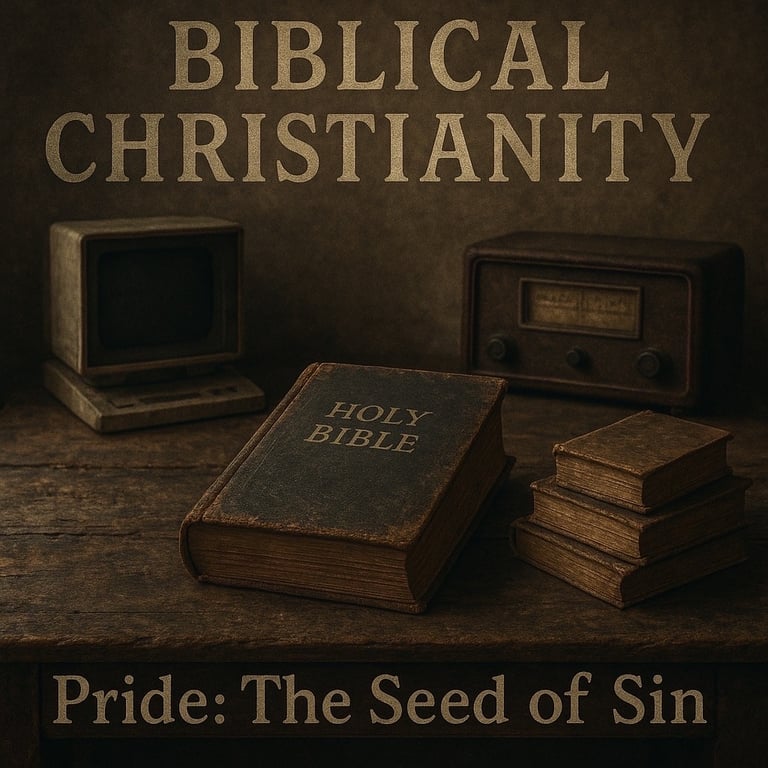

Chapter 4a: Pride Feeds the Cycle — How Sin Multiplies
Sin is rarely a one-time act.
It’s a seed that grows.
And pride is the soil that feeds it.
At first it seems small.
A thought.
A glance.
A silent “yes” to something forbidden.
But pride keeps watering it.
Defending it.
Nurturing it.
Until it grows into something monstrous.
Temptation. Consent. Concealment. Decay.
James lays out the cycle clearly:
“Each person is tempted when he is lured and enticed by his own desire.
Then desire when it has conceived gives birth to sin,
and sin when it is fully grown brings forth death.” — James 1:14–15
It begins with a desire.
Not evil in itself.
But once entertained—pride steps in and says:
– “I deserve this.”
– “It’s not that bad.”
– “No one needs to know.”
– “I can stop anytime.”
That’s when desire conceives.
And when sin is born,
pride raises it.
Pride Doesn’t Just Birth Sin—It Defends It
Pride keeps us from confessing.
“Whoever conceals his transgressions will not prosper…” — Proverbs 28:13
But pride says:
– “You’ll lose face.”
– “You’ll look weak.”
– “Just manage it quietly.”
So we double down.
We rationalize.
We hide.
We repeat.
And with each repetition,
sin feels more natural—less dangerous.
The conscience dulls.
The heart hardens.
The blindness spreads.
The Habit of Justifying
Pride not only hides sin—
it gives it a microphone.
– “This is who I am.”
– “God understands.”
– “I’ve earned this escape.”
– “At least I’m not like them.”
Like David before Nathan arrived,
we become experts at self-deception.
Sin becomes a pattern.
Then a lifestyle.
Then a fortress.
“They did not see fit to acknowledge God…
so God gave them over…” — Romans 1:28
That’s the endgame of pride.
Not just to fall—
but to never rise again.
Until It Grows Up
James says sin “grows.”
Like a child.
Like a slow cancer.
It doesn’t show its full form immediately.
It waits.
– First, a thought.
– Then a word.
– Then a habit.
– Then a destiny.
Pride keeps it alive long enough to kill us.
The Opposite Path
But Scripture also shows the way out:
“He who confesses and forsakes them will obtain mercy.” — Proverbs 28:13
“Create in me a clean heart… renew a right spirit within me.” — Psalm 51:10
“If we confess our sins, He is faithful and just to forgive…” — 1 John 1:9
But confession requires humility.
Repentance requires surrender.
Change requires light—
and pride fears the light.
Christ Breaks the Cycle
At the cross,
Jesus breaks the power of both sin and pride.
He calls us not just to be forgiven—
but to be free.
To bring the hidden into the open.
To stop watering what’s killing us.
To admit:
“I can’t fix this.
I need grace.”
And in that moment,
death loses its grip.
What Does It Matter?
Pride doesn’t just cause sin—
it protects it.
It turns moments into habits.
Habits into patterns.
Patterns into identity.
And identity into ruin.
This is why pride is so insidious.
It tells us we’re in control
while quietly leading us toward destruction.
Only humility can interrupt the cycle.
Only surrender can sever the root.
Reflection and Questions
What sin in my life have I excused or minimized over time?
Is there something I’ve repeated so often it now feels normal?
Have I hidden sin out of fear of being exposed or embarrassed?
What would it look like to break the cycle—with honesty and humility?
What habit needs the light of Christ today?

